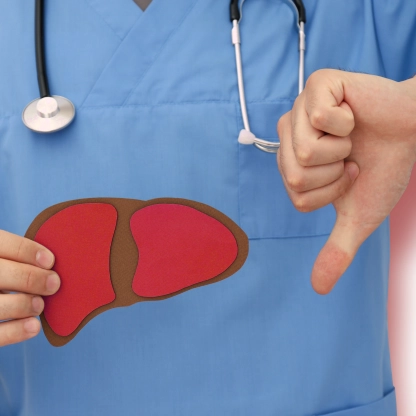
Article summary
Topic
Autoimmune diseases can be compared to self-sabotage – it is a situation in which your body starts attacking its own tissues. This condition can affect various organs. In the case of the liver, this condition is called autoimmune hepatitis (AIH for short). In AIH, the immune system attacks hepatocytes, which are liver cells. Because of dysfunctional receptors, the body treats such hepatocytes as "hostile" and begins to gradually destroy them.1
In AIH, the immune system attacks hepatocytes, which are liver cells
What causes AIH?
The disease was first described in the 1950s, but to this day it remains unclear why the body turns against itself. Scientists believe that the AIH may bae caused by a mixture of:
How to recognize AIH?
In the early stages, people with AIH may not have symptoms or may not associate the unspecific symptoms with this disease. Both, symptoms and severity vary from person to person.
The most common symptoms of AIH include:
Feeling more tired than usual and getting tired easily
General malaise
Mild joint or muscle pain
Lack of appetite and weight loss
Nausea
Itching and skin rashes
Excessive hair growth
Missed periods
Abdominal pain or bloating2
Accelerate liver regeneration with Phospholipids (Essentiale® Forte P)
What are the ways to diagnose AIH?
Because in many cases symptoms do not appear or resemble the symptoms of other conditions, early stage AIH is often diagnosed during routine examinations or tests.
If the doctor suspects AIH, then they order a series of blood tests and an ultrasound scan of the liver, which are intended to exclude other diseases of this organ, AIH is diagnosed mainly based on test results of the following factors:
- Transaminase activity
enzymes involved in the metabolism of amino acids, - The presence of specific antibodies
such as smooth muscle autoantibody4, - Hypergammaglobulinemia
a state of increased concentration of protein in blood serum, - Prothrombin time
used to assess the extrinsic blood clotting system.
How to treat AIH?
The main aim of treatment in autoimmune hepatitis (AIH) is to stop the inflammation of the organ by reducing the activity of the immune system. This is done through a combination of medication and therapy.3
Reducing inflammation alleviates disease symptoms, improves liver test results, and prevents long-term damage to the organ, including liver failure.
Treatment is lengthy, usually lifelong, because an interruption in treatment can result in a recurrence of AIH. If you have been diagnosed with AIH, it is necessary to maintain a proper diet which includes:
FAQ
Autoimmune hepatitis is a chronic disease which, if untreated, can lead to cirrhosis and eventually liver failure. However, with early diagnosis and proper treatment, autoimmune hepatitis can often be controlled.
- Diehl AM et al. Underlying potential: cellular and molecular determinants of adult liver repair. The Journal of Clinical Investigation 2013; 123 (5): 1858-1860.
- Sawicki W. Histology. PZWL Medical Publishing. Warsaw 2005; 26: 437
- Gundermann KJ et al. Activity of Essential Phospholipids (EPL) From Soybean in Liver Diseases. Pharmacol Rep 2011; 63 (3): 643–59.
- Wydawnictwo Literat, Advice of a Family Doctor - Liver; https://www.sw.gov.pl/assets/74/85/60/7f47ba721664a364cd57d0f447bf255bfa055ee7.pdf access 03/05/2021
- American Liver Foundation, A Healthy Diet, a Healthier Liver, a Healthier You https://liverfoundation.org/for-patients/about-the-liver/health-wellness/nutrition/ - access date: 29/03/2021.
- Recommendations of PTG and PTMR: Recommendations for management of patients with hepatic dysfunction and cholelithiasis for primary care physicians; POZ doctor 4/2017
- Kozłowska-Wojciechowska M. Essential phospholipids. Therapy - in the family doctor's office; 2014 Jun; 6 Issue 2 (307): 13-15
%20(1)%20(1).webp)

